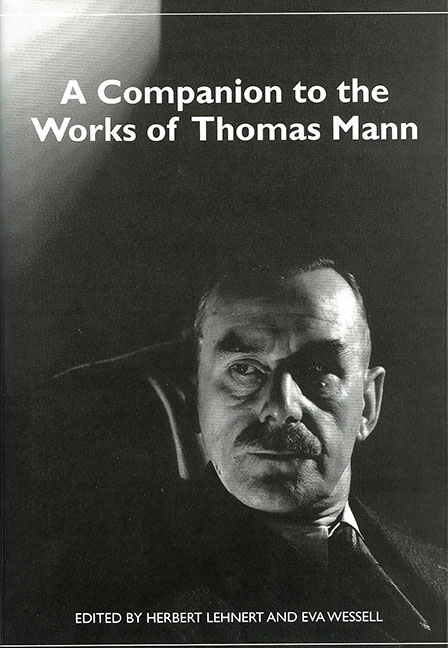Book contents
- Frontmatter
- Contents
- Foreword
- Thomas Mann's Works
- List of Abbreviations
- Introduction
- Thomas Mann's Beginnings and Buddenbrooks
- Art and Society in Thomas Mann's Early Novellas
- Love in Society: Thomas Mann's Early Stories
- “Death in Venice”
- “Mein ‘Friedrich’ — das ist was Anderes”: Thomas Mann's Unwritten Novel about Frederick the Great, King of Prussia
- Magic and Reflections: Thomas Mann's The Magic Mountain and His War Essays
- Thomas Mann's “Autobiographical” Stories
- Joseph and His Brothers
- Lotte in Weimar
- Thomas Mann's Late Politics
- “German” Music and German Catastrophe: A Re-Reading of Doktor Faustus
- The Gaze of Love, Longing, and Desire in Thomas Mann's “The Transposed Heads” and “The Black Swan”
- Felix Krull
- Female Identities and Autobiographical Impulses in Thomas Mann's Work
- Betrayed or Not Betrayed: A Testament?
- Thomas Mann's Comedies
- Notes on the Contributors
- Select Bibliography
- Index
“Mein ‘Friedrich’ — das ist was Anderes”: Thomas Mann's Unwritten Novel about Frederick the Great, King of Prussia
Published online by Cambridge University Press: 28 April 2017
- Frontmatter
- Contents
- Foreword
- Thomas Mann's Works
- List of Abbreviations
- Introduction
- Thomas Mann's Beginnings and Buddenbrooks
- Art and Society in Thomas Mann's Early Novellas
- Love in Society: Thomas Mann's Early Stories
- “Death in Venice”
- “Mein ‘Friedrich’ — das ist was Anderes”: Thomas Mann's Unwritten Novel about Frederick the Great, King of Prussia
- Magic and Reflections: Thomas Mann's The Magic Mountain and His War Essays
- Thomas Mann's “Autobiographical” Stories
- Joseph and His Brothers
- Lotte in Weimar
- Thomas Mann's Late Politics
- “German” Music and German Catastrophe: A Re-Reading of Doktor Faustus
- The Gaze of Love, Longing, and Desire in Thomas Mann's “The Transposed Heads” and “The Black Swan”
- Felix Krull
- Female Identities and Autobiographical Impulses in Thomas Mann's Work
- Betrayed or Not Betrayed: A Testament?
- Thomas Mann's Comedies
- Notes on the Contributors
- Select Bibliography
- Index
Summary
On returning from his first visit to the USA, Thomas Mann found “a beautiful old book” waiting for him in Küsnacht, his Swiss refuge outside Zurich. It bore the title Johann Müller's Briefe an seinen ältesten Freund in der Schweiz (Johann Müller's Letters to His Oldest Friend in Switzerland) and contained the dedication: “Thomas Mann / mit guten Wünschen herzlich gedenkend / zum 6. Juni 1934 / Köln Ernst Bertram” (To Thomas Mann / with good wishes and cordially thinking of him / for the 6th June 1934 / Cologne Ernst Bertram).
Müller was a historian and a contemporary of Goethe. Some of the letters, which had been published posthumously from his literary remains, testify to the high regard Müller had for Frederick II and his “most glorious deeds.” Müller (1752–1809) had quoted four lines of verse from one of Frederick's letters, together with some words of Christ admired by the monarch:
La mort est un repos, mais vivre c'est agir.
Le repos est permis, mais c'est sur les lauriers.
Les Arts sont comme Eglé, dont le coeur n'est rendu
Qu’à l'amant le plus tendre et le plus assidu.
Words by Frederick who is the glory of humanity and my hero. In yet another place in this letter one can read: In the entire gospel by Saint John no passage is as beautiful as: “I must act as long as day prevails; night will fall when no-one can work.
Mann marked the first sentence of this homage to the king with an “x.” Lines of verse and the quotation from the Bible reminded the exile of a time in his own past. Thirty years earlier he had planned to write a “historical novel with the title of ‘Friedrich,’” because at the time he had regarded the king of Prussia as a “great” man and king. In 1739, while still crown prince, Frederick had defined his future office in his Antimachiavell (1740) in this manner: “The sovereign is under no circumstances an absolute ruler of his people who are under his yoke; he is instead no more than the highest of the civil servants.”
- Type
- Chapter
- Information
- A Companion to the Works of Thomas Mann , pp. 115 - 128Publisher: Boydell & BrewerPrint publication year: 2004

